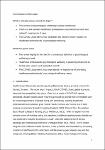Perceptions of healthcare professionals’ psychological wellbeing at work and the link to patients’ experiences of care: A scoping review
| dc.contributor.author | Bamforth, K | |
| dc.contributor.author | Rae, P | |
| dc.contributor.author | Maben, J | |
| dc.contributor.author | Lloyd, H | |
| dc.contributor.author | Pearce, S | |
| dc.date.accessioned | 2023-10-12T11:32:31Z | |
| dc.date.available | 2023-10-12T11:32:31Z | |
| dc.date.issued | 2023-12 | |
| dc.identifier.issn | 2666-142X | |
| dc.identifier.issn | 2666-142X | |
| dc.identifier.other | 100148 | |
| dc.identifier.uri | https://pearl.plymouth.ac.uk/handle/10026.1/21384 | |
| dc.description.abstract |
Background: Healthcare professionals’ psychological wellbeing at work affects patients’ experiences of care. However, the literature tends to focus on negative aspects of psychological wellbeing, such as stress and burnout, and interventions to support healthcare professionals’ wellbeing have limited effectiveness. The growing global concern over the psychological wellbeing of healthcare professionals has escalated following the COVID-19 pandemic. There is an urgent need to review the recent literature on healthcare professionals' psychological wellbeing to identify gaps in our knowledge. This scoping review will help focus the future research to improve the psychological wellbeing of healthcare staff and thereby patients’ care experiences. Aim: This scoping review aims to answer two research questions: 1) What do we know about healthcare professionals' and patients' perceptions of healthcare professionals' psychological wellbeing at work? 2) How does the psychological wellbeing of healthcare professionals at work affect patients' experiences of care? Method: We conducted a scoping review using frameworks developed by Arksey and O'Malley (2005) and Levac, Colquhoun and O'Brien (2010). Our comprehensive literature search covered publications dated 2011–2021 in PubMed, CINAHL, Scopus and PsychInfo, NIHR Journals, EThOS, Open Grey, Google Scholar, and the Department for Health and Social Care and Kings Fund websites. We also hand-searched the reference lists of included studies. Two independent reviewers assessed the eligibility of studies. Results: We included 56 articles from 16 countries, most using qualitative methods. We identified five themes: 1) The definition of healthcare professional psychological wellbeing; 2) The relationship between healthcare professionals’ psychological wellbeing and nature of healthcare work; 3) The role of organisational culture in healthcare professionals’ psychological wellbeing and the importance of organisational culture; 4) The impact the COVID-19 pandemic on of healthcare professionals’ psychological wellbeing; and 5) The link between healthcare professionals’ psychological wellbeing and patients’ experiences of care. We found a complex relationship between organisational culture, healthcare professionals’ perceptions of psychological wellbeing, and patients’ experiences of care. Conclusion: While there is currently no consensus on the definition of psychological wellbeing in healthcare professionals, our review highlights its relation to organizational culture and its impact on patients' experiences of care. Future research should include patients' perspectives and develop meaningful ways to support, develop, and retain healthcare professionals. Tweetable abstract: Scoping review: wellbeing of healthcare professionals is poorly understood. Basic needs must be met first to support staff to care @KathrynBamforth | |
| dc.format.extent | 100148-100148 | |
| dc.language | en | |
| dc.publisher | Elsevier BV | |
| dc.subject | Burnout | |
| dc.subject | professional | |
| dc.subject | psychological | |
| dc.subject | Patient satisfaction | |
| dc.subject | Workforce | |
| dc.title | Perceptions of healthcare professionals’ psychological wellbeing at work and the link to patients’ experiences of care: A scoping review | |
| dc.type | journal-article | |
| dc.type | Review | |
| plymouth.volume | 5 | |
| plymouth.publication-status | Published | |
| plymouth.journal | International Journal of Nursing Studies Advances | |
| dc.identifier.doi | 10.1016/j.ijnsa.2023.100148 | |
| plymouth.organisational-group | |Plymouth | |
| plymouth.organisational-group | |Plymouth|Research Groups | |
| plymouth.organisational-group | |Plymouth|Faculty of Health | |
| plymouth.organisational-group | |Plymouth|Faculty of Health|School of Nursing and Midwifery | |
| plymouth.organisational-group | |Plymouth|Faculty of Health|School of Psychology | |
| plymouth.organisational-group | |Plymouth|Research Groups|Institute of Health and Community | |
| plymouth.organisational-group | |Plymouth|Research Groups|Institute of Translational and Stratified Medicine (ITSMED) | |
| plymouth.organisational-group | |Plymouth|Research Groups|Institute of Translational and Stratified Medicine (ITSMED)|CCT&PS | |
| plymouth.organisational-group | |Plymouth|REF 2021 Researchers by UoA | |
| plymouth.organisational-group | |Plymouth|Users by role | |
| plymouth.organisational-group | |Plymouth|Users by role|Academics | |
| plymouth.organisational-group | |Plymouth|REF 2021 Researchers by UoA|UoA03 Allied Health Professions, Dentistry, Nursing and Pharmacy | |
| plymouth.organisational-group | |Plymouth|REF 2021 Researchers by UoA|UoA04 Psychology, Psychiatry and Neuroscience | |
| plymouth.organisational-group | |Plymouth|Research Groups|FoH - Community and Primary Care | |
| plymouth.organisational-group | |Plymouth|Research Groups|Plymouth Institute of Health and Care Research (PIHR) | |
| dcterms.dateAccepted | 2023-07-30 | |
| dc.date.updated | 2023-10-12T11:32:24Z | |
| dc.rights.embargodate | 2023-10-17 | |
| dc.identifier.eissn | 2666-142X | |
| dc.rights.embargoperiod | forever | |
| rioxxterms.versionofrecord | 10.1016/j.ijnsa.2023.100148 |


